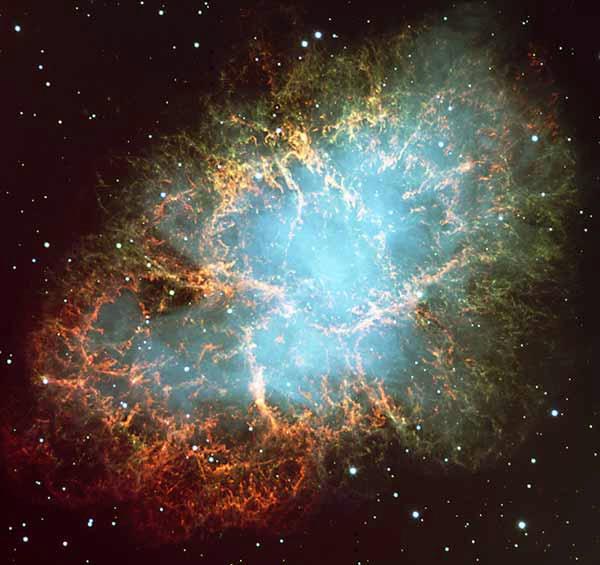An evolutionist’s perspective on the Universe from the ever-cogent EggBert himself:
But what good does it do me to think of the universe as an unthinking mechanism vast beyond comprehension? It gives me the consolation of believing I conceive it as it really is. It makes me thankful that I can conceive it at all. I could have been a pair of ragged claws, scuttling across the floors of silent seas. In this connection I find the Theory of Evolution a great consolation. It helps me understand how life came about and how I came to be. It reveals a logical principle I believe applies everywhere in the universe and at all levels: Of all the things that exist, animate and inanimate, some will be more successful than others at continuing to exist. Of those, some will evolve into greater complexity. This isn’t “progress,” it is simply the way things work. On this dot of space and in this instant of time, the human mind is a great success story, and I am fortunate to possess one. No, even that’s not true, because a goldfish isn’t unfortunate to lack one. It’s just that knowing what I know, I would rather be a human than a goldfish.
Some reject the Theory of Evolution because it offers no consolation in the face of death. They might just as well blame it for explaining why minds can conceive of death. Living things must die. That I can plainly see. That we are aware of our inevitable death is the price we must pay for being aware at all. On the whole, I think we’re getting a good deal.
When I die, what happens? Nothing much. Every atom of my body will continue to exist. The sum of the universe will be the same. The universe will not know or care.
He keenly and convincingly finds paradoxical comfort in the ineffable vastness of the great unknown, and the perplexing eventuality of the sentient beings that we are — that is, mankind being the result of atomic and subatomic particulates from an exploded star (supernova) — particulates with an avid agenda. Yet, I find the very existence of “animate” (or even inanimate) subatomic, atomic, molecular, cellular and microbial “life” a vast mystery in of themselves. Unseen particles of “energy” with one feral purpose: to evolve into something greater, into a greater intelligence. My question to EggBert is: Where does that “energy” come from? Where does that subatomic “purpose” come from? It is a desire, is it not? A design. Atomic energy, to me, is comprised of invisible vessels of design and propulsion. Energy seedlings. In the seed, there is power.
Who turned the power on? As a Creationist, I find that the quintessence of dust (by dust I think stardust), and the manner in which we choose to perceive it, requires a Kierkegaardian leap of faith, notwithstanding which side of the debate you fall on. This specific subject of quintessence (in relation to the universe) is like a coin — and a coin will always have two sides. Call me an old-fashioned, Paley-bred teleologist, but it is within natural design, energy and purpose that I see God, not a random explosion of life.

I loved Ebert’s article, but was somewhat dismayed by this statement as he was setting up his conclusion:
“My curiosity leads me to science, my admiration for logic leads me to the Theory of Evolution, my pride rejects simplistic fables to describe the facts I observe.”
Is pride the sole reason he (and to an extent, others) should use to reject the fables and myths of old? I know that’s probably not the case. I give Ebert more credit than that. I believe his article was not meant to deal with the myths and fables, but rather with his interaction with the Evolutionary Theory, and thus, it’s a good article.
However, the point remains that fables and myths have a place in our society, whether you believe them or not, they also bring a lot to the table. Science cannot explain the existence of good and evil, the development of morality (although there are arguments as to how ethics are tied to basic evolutionary theory), or the complexity of love. For example, in a reasonable society, would it be necessary to mourn for the dead, to frown upon suicide, or to look unfavorably towards the ill-treatment of those who are weaker or disenfranchised? Sympathy, forgiveness, and grace are concepts that seem foreign in a world of Science and Intellect.
That’s not an argument as to whether we should or shouldn’t believe in myths and fables, but it speaks volumes to the limitations of logic and reason when speaking about human nature and our understanding of origins.
In general, my viewpoint is that within the context of whether God exists or if god is merely a metaphor to speak of the unknown energy that cannot be created or destroyed, many questions remain uncovered or simply ignored. And ultimately, we must rest our faith in the collective intellect of mankind (which itself has evolved through the ages), and/or in the experiential and emotional stories that have persisted within the human psyche for ages and ages. For some, it is an either/or scenario. For others, it is both/and.
LikeLike